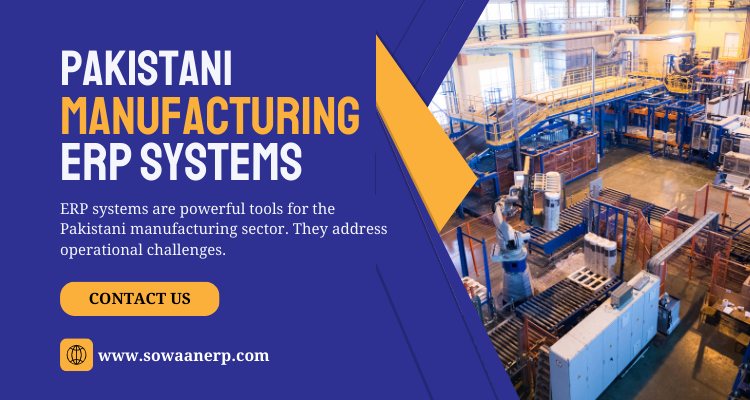
The Pakistani manufacturing sector is a dynamic landscape, ripe with potential but also competitive. As it evolves, the need for efficient, integrated solutions grows. This is where Enterprise Resource Planning (ERP) systems come into play. Choose the ERP solution in Pakistan can be a game-changer for manufacturers, helping them streamline processes and gain a competitive edge.
Challenges faced by Pakistani manufacturers
Manufacturers in Pakistan face several challenges. Inefficient supply chains, lack of real-time data, poor inventory management, and quality control issues top the list. Different sub-sectors, like textiles, food processing, and pharmaceuticals, have unique needs. To overcome these challenges, integration, collaboration, and data-driven decisions are vital.
Additionally, Pakistan’s aging infrastructure often hampers effective transportation and logistics, further complicating supply chain efficiency. Currency fluctuations and trade barriers also pose significant hurdles, particularly for multinational and national exporter companies. Power shortages and administrative flaws can also impede industrial productivity. Furthermore, the country is dealing with a current account deficit and currency depreciation, which can impact the cost of imports and the overall stability of the manufacturing sector. Therefore, manufacturers need to devise an appropriate policy framework, enforce strict quality control, and increase exportable industrial surplus to respond to these challenges
How ERP systems drive manufacturing excellence in Pakistan?
In the modern business landscape, Enterprise Resource Planning (ERP) systems have become a fundamental tool for driving manufacturing excellence. These comprehensive software solutions integrate all aspects of a business, from production and inventory management to quality control and supply chain management. In Pakistan, manufacturers are increasingly leveraging ERP systems to navigate industry challenges, streamline operations, and drive growth.
Production planning and scheduling
Top ERP software in Pakistan can revolutionize the manufacturing process by optimizing production planning and scheduling. They can automate work orders, including details such as execution time, customer name, and sales order. This automation reduces manual intervention, minimizes errors, and increases efficiency.
Inventory management
Inventory management is a critical aspect of manufacturing. ERP systems provide real-time inventory data, helping to prevent stockouts and overstocks. They can also automate replenishment strategies, ensuring that materials are always available when needed.
Quality control
Quality control is integrated into workflows with ERP systems. They can track defects and other quality issues, enabling manufacturers to take corrective action promptly. This integration ensures that quality standards are consistently met, enhancing the reputation of the company.
Supply chain management
Supply chain management becomes more efficient with ERP systems. They improve material flow, reduce waste, and enhance collaboration with suppliers. By providing visibility into the supply chain, ERP systems enable manufacturers to respond quickly to changes and disruptions.
Maintenance and repair scheduling
The best ERP Software in Pakistan make maintenance schedules trackable, maximizing uptime. They can generate alerts for scheduled maintenance or repairs, preventing unexpected equipment breakdowns and production stoppages.
Data-driven decision making
Lastly, ERP systems enable data-driven decision-making. They provide valuable insights into production costs, resource utilization, and market trends. This information can be used to optimize processes and identify cost-saving opportunities.
Choosing the right ERP system for Pakistani manufacturers
Selecting the right ERP software in Pakistan requires understanding your production needs and challenges. Look for vendors familiar with the Pakistani manufacturing sector and local regulations. User-friendliness and system integration are crucial. Compliance with local data security standards is a must. Finally, robust training and support from the best ERP service provider in Pakistan can ensure successful implementation.
In addition, you should also consider the scalability of the ERP solution. As your business grows, your ERP system should be able to adapt and expand accordingly. The ERP software should also offer industry-specific features that cater to your unique manufacturing processes and requirements.
Moreover, evaluate the cost-effectiveness of the ERP system. While it may be tempting to choose the least expensive option, remember that the value of an ERP system lies in its ability to streamline operations and improve efficiency. Therefore, consider the long-term return on investment rather than just the upfront cost.
Lastly, check the reputation and track record of the ERP vendor. Look for customer testimonials and case studies that demonstrate the vendor’s expertise and reliability. An established vendor with a proven track record is more likely to provide a high-quality and reliable ERP solution.
The role of top corporate ERP solutions in Pakistan
Top corporate ERP solutions in Pakistan play a significant role in transforming the manufacturing sector. They not only streamline operations but also enable manufacturers to make informed decisions. These solutions offer comprehensive modules covering all aspects of manufacturing, from procurement to delivery, ensuring seamless operations and increased productivity.
Furthermore, these ERP solutions provide robust data analytics and reporting tools that allow manufacturers to gain insights into their operations. This data-driven approach aids in identifying inefficiencies and areas for improvement, leading to cost savings and enhanced profitability. Moreover, top ERP solutions foster collaboration across different departments, breaking down silos and promoting effective communication. This integrated approach results in improved coordination and faster decision making.
Also, by automating routine tasks, these ERP systems free up employees’ time, allowing them to focus on more strategic initiatives. This leads to increased employee productivity and satisfaction. Lastly, these solutions help manufacturers comply with local regulations and international standards, reducing the risk of non-compliance and potential penalties.
Conclusion
ERP systems are powerful tools for the Pakistani manufacturing sector. They address operational challenges and drive manufacturing excellence. By choosing the right system and implementing it effectively, manufacturers can optimize their operations, make data-driven decisions, and gain a competitive edge in the market.
These systems have proven to be revolutionary, enabling businesses to automate their processes, thereby reducing dependence on manual labor and minimizing errors. This automation also accelerates the production process and streamlines operations across the board. Furthermore, ERP systems provide valuable oversight into business operations, offering visibility that can lead to improved decision-making and strategic planning. Therefore, the adoption and effective implementation of an ERP system is not just a beneficial move but a necessary one for Pakistani manufacturers aiming to thrive in today’s competitive business landscape.



